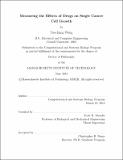Measuring the effects of drugs on single cancer cell growth
Author(s)
Weng, Yaochung
DownloadFull printable version (8.176Mb)
Other Contributors
Massachusetts Institute of Technology. Computational and Systems Biology Program.
Advisor
Scott R. Manalis.
Terms of use
Metadata
Show full item recordAbstract
Understanding the effectiveness of a drug therapy on halting disease progression is an essential aspect of cancer biology. Conventional assays that study cell behavior after a drug intervention report the average response of a cell population which can mask the heterogeneity and dynamics of seemingly identical cells. Recently, many single-cell techniques have been developed, but there are currently no methods that can fully characterize the long-term effects of drug treatment on cancer cell growth. To accomplish such, we developed an instrument to measure single-cell growth before and after drug treatment. In order to achieve femtogram-level mass resolution, we employed the suspended microchannel resonator (SMR), a vacuum-packaged cantilever with an embedded channel. Here, we describe three implementations that involve different technologies (optical trap, mechanical trap, and dynamic ow trapping) to capture a cell for repeated measurements and to perform drug delivery. Applying the technique we developed based on the dynamic ow trapping, we were able to monitor one or more generations of a cancer cell before and after drug treatment. We investigated the growth of mouse leukemia cells in response to drugs that inhibit the mammalian target of rapamycin (mTOR) pathway, induce apoptosis, or prevent translational activity directly at the ribosome. Our method was able to discern a particular growth signature for each drug investigated and to discover a new phenotype in cells following mTOR inhibition. Furthermore, our data demonstrates that the instantaneous growth rate changes following a drug treatment could potentially predict the long-term inhibitory effect on cellular biogenesis and mass accumulation.
Description
Thesis (Ph. D.)--Massachusetts Institute of Technology, Computational and Systems Biology Program, 2012. This electronic version was submitted by the student author. The certified thesis is available in the Institute Archives and Special Collections. Cataloged from student submitted PDF version of thesis. Includes bibliographical references.
Date issued
2012Department
Massachusetts Institute of Technology. Computational and Systems Biology ProgramPublisher
Massachusetts Institute of Technology
Keywords
Computational and Systems Biology Program.